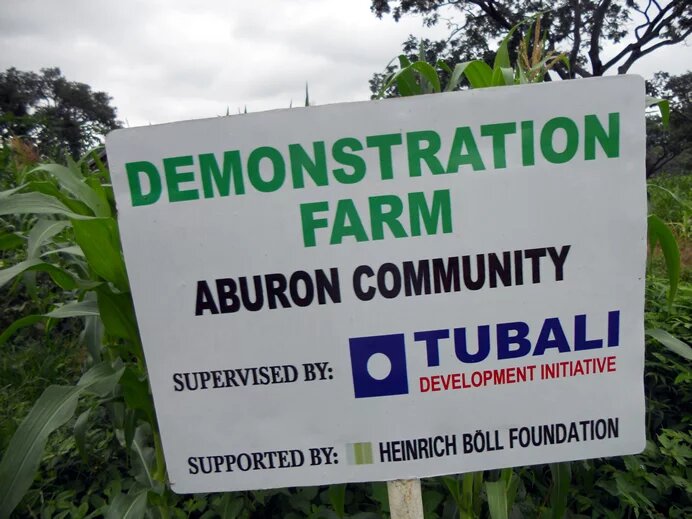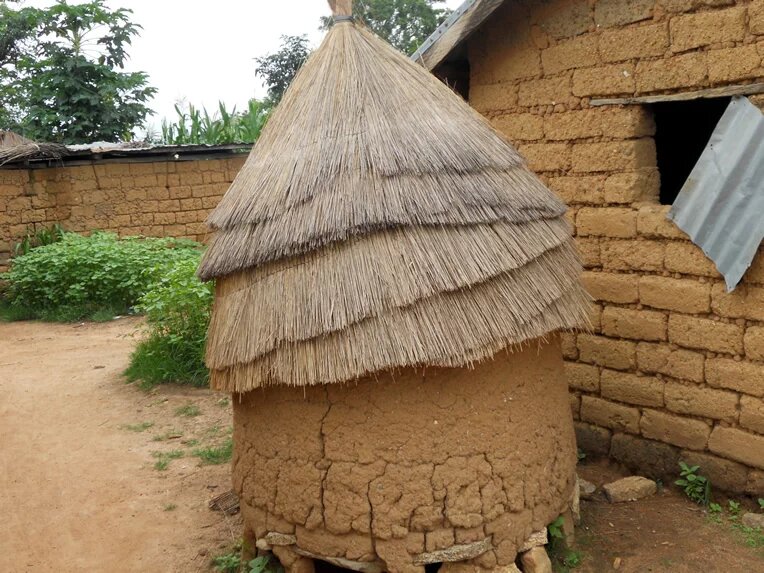
Kaduna State, Northern Nigeria – Cifatake and Aburon Communities
According to Mrs Hauwa Mustapha, the director of Tubali Development Initiative, most of the farmers in northern Nigeria would attribute the scourge of climate change to superstition and religious beliefs, which made many farmers think they were helpless in finding a solution to their shrinking harvests. The food security project started in 2010 in two communities in Kaduna State, and initially researched into better farming practices that would withstand the increasing heat and degrading soils. Tubali then engaged the agricultural extension services and brought farmers and experts together around the findings of the research. Thus, the food security project saw the bridging of the network gap between research institutes, agricultural extension services and the farmers, a network that hardly existed before.
Most of the farming methods, especially here in northern Nigeria, have been passed down from generation to generation. Getting the farmers to embrace a different way of farming proved difficult, which led Tubali to create model farms. Mrs Hauwa Mustapha explains, “We said to them give us a farmland, we are not taking over the farmland but we want to demonstrate to you an alternative way of doing what you do best. We will shoulder the risk but whatever comes out at the end of the day belongs to you the community”. The increasing harvests proved her right.
Four years on, the farmers in Cifatake and Aburom say they are beginning to see better yields as compared to the past. Muntari Dahiru, pointing to his farm crops, said “These tomatoes are not even up to 3 weeks old and they are already bearing fruits”; while Mr Mohammed Sani Ibrahim, a maize farmer, said, “In the past we could harvest only 30 bags worth of yield but now we get more than 40 bags”.
Enugu State, South Eastern Nigeria: Owelli and Ugwogwo Communities
Piles of cassava tubers lying on the dark brown earth, waiting to be lifted into the waiting trucks. The workers are chatting whilst they throw and catch heavy bags. The cassava is destined for the foodstuff market in Enugu, the state capital which lies about 30km away. Standing next to one of the trucks is Charles Okafor, talking enthusiastically about how his fortunes would change for good. Reflecting on his many years as a farmer in the community of Owelli, he recalls that one of the major challenges he faced over the years was the absence of the appropriate seed varieties for planting. During many years of tilling the soil and tending the crops, Okafor depended on the traditional seeds of the area. His yields were going down year by year, whilst the size of his family grew.
Unable to do anything about it, this man who describes himself as a hardworking farmer, could only accept whatever fate threw at him during the time of harvest. On many occasions, the poor harvests left him in quandary. So why is Okafor so upbeat today? “When the Tubali NGO came to talk about climate change to us, and how it was affecting our soils, it all made sense. But still, we could not simply abandon our old ways of farming; the risk of losing the harvest would have been too great. But see what the demonstration farm has yielded: a much better result than our own!”
The demonstration farm, which is inspiring new hope in Okafor and other farmers in Owelli community, is one of the activities aimed at getting rural farmers to adapt to the impacts of climate change on agriculture. A more resilient variety of cassava was planted on the Owelli demonstration farm, and the stems were planted further apart – a technique that farmers initially resisted, fearing that less stems on a square metre would yield less cassava. But the results surprised them: less cassava stems meant a better growth and a higher kilogramm yield per hectare.
Seeing a three fold increase in the yields on the demonstration farm, Okafor and his fellow farmers in Owelli are not only changing to the improved cassava variety, they also welcome some of the younger farmers back into their community. A youth in the community, Nwangu Chukwubike Nnana, says the Tubali initiative is inspiring young people to return to the farm. “The youths, because of what we used to know farming to be, abandoned the land and left for other white collar jobs. We have always seen farming as an old man’s thing. But Tubali came on board and it has given us a new picture of farming, in terms of forming a cooperative, and doing things as a group. It has actually revived the interest of the youth, and many have started going back to farming.”
But the story in the community of Ugwogwo is different: here, the harvest was poor. According to the director of Tubali NGO, the reasons were manifold, ranging from allocation of degraded land as demonstration plot, to the failure by farmers from Ugwogwo to tend the crop as at when due. “Farmers don’t easily trust new initiatives, that’s normal”, says Hauwa Mustapha, “especially when they are brought from outside the community. That is why we had to spend a lot of time on networking, between farmers, researchers, extension workers and ourselves,” she said.
A visibly miffed farmer, Mba Shadrack vowed that he would not miss the opportunity a second time. “With these amazing results from the demonstration harvest in Owelli, we are excited… Our cassava production would get a fillip when we plant the new variety!”.
The Tubali project has become popular in Enugu State, even with the agricultural extension services. They have increased the number of extension workers and have dispatched some to the 'Tubali communities'. The farmers are in regular contact with the extension services and are continuously increasing their knowledge of farming techniques.
